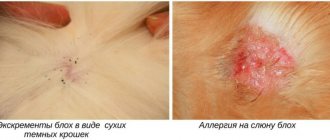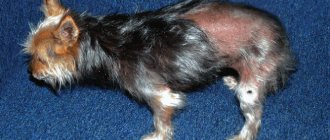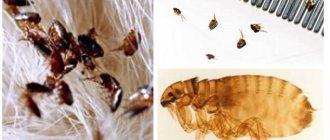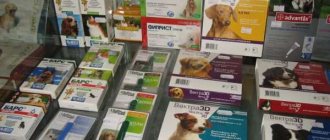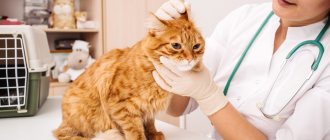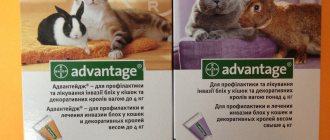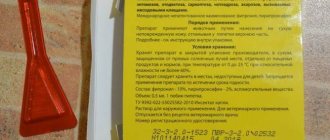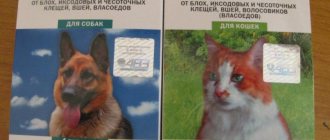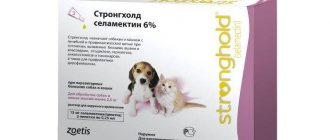Overdose of drugs against fleas and other parasites is a rare situation, but sometimes severe forms of intoxication of the animal occur. Panic in the owner of a cat or dog creates an additional danger of erroneous actions. The main task is to prevent complications when an animal is poisoned. Below we will consider how to promptly identify intoxication in a pet and emergency measures when symptoms of a serious condition are detected.
Why does poisoning occur?
Fleas are dangerous parasites; they provoke the occurrence of a number of pathologies. Effective drugs can rid an animal of parasites in a short period of time. Anti-flea products are available in the form of:
- most often - drops or sprays (for example, Andvatej);
- shampoos, liquid soap;
- collars;
- chewable tablets (such as Bravecto for dogs);
- solution for intramuscular injection (for example, Pirostop - used more often to combat ticks and blood parasitic diseases in dogs and cattle);
- combination drugs that help against both internal pests (worms) and external pests (fleas) (for example, Stronghold).
Intoxication with anti-flea drugs occurs more often in cats and small dogs; in large breeds such poisoning is rare.
Let's look at the reasons why poisoning with flea repellents in cats and dogs is possible:
- Violation by the pet owner of the recommendations and dosage of the drug (based on the weight of the pet) given in the instructions.
- Using low-quality or expired products. Purchase medications only from specialized retail outlets, veterinary pharmacies and clinics.
- Treating infant kittens and puppies with flea and tick medications up to two months. Their barrier functions of the body are not sufficiently developed, and intoxication occurs rapidly, leading to irreparable consequences and even death. In addition, the mother herself, while washing the cubs, eats the poison.
- For the same reason, you should not use flea treatments on an infected animal. The toxin applied to a cat or bitch can harm the offspring.
- Application of the product not in the withers area, but on another part of the body. Poisoning with flea drops occurs through licking of the drug by a pet - this is more typical for cats.
- Personal intolerance to any substance in an animal, leading to an allergic reaction.
Popular insecticides contain permethrin , an effective compound that is safe for dogs but extremely toxic for cats. Overdose of permethrin-containing drugs (for example, Bars for dogs) in cats is fatal. Intoxication is inevitable if a cat is treated with a dog product or interacts with a treated dog.
Ways to combat parasites in kittens of different ages
Every owner wants to free his ward from uninvited guests as efficiently and carefully as possible. There are different ways to control fleas:
- mechanically clean - bathe and remove fleas manually or by combing; You can remove fleas from a kitten by combing
- wash the kitten with antiparasitic shampoo;
- apply other antiparasitic agents;
- choose gentle folk recipes.
In kittens up to 1 month
At the age of up to 1 month, the kitten is not yet ready for potent drugs; its immunity is weak and susceptible to infections and diseases. Therefore, our recommendation would be to postpone the fight against bloodsuckers until the age of 3-4 months, if there are still few fleas. Only if the animal is constantly itching and tearing the skin with its claws can mechanical treatment begin:
- Wash the old bedding and put on a new one.
- Vacuum and wash the area where the kitten lives.
- Comb out parasites with a fine-toothed comb. Parasites on a kitten should be combed out with a fine-toothed comb.
Try to do these manipulations as often as possible - preferably every day. Such procedures will alleviate the kitten’s condition and delay the use of antiparasitic drugs.
In kittens up to two months
If the kitten’s condition is deplorable, and you can’t wait to help your pet, find flea shampoo for kittens up to two months on sale.
You need to wash your kitten with flea shampoo as follows:
Start by trimming your pet's nails, otherwise your hands could get pretty damaged. Check that there are no drafts and that the house is warm. Cats get very cold after bathing. Then prepare the necessary tools: a basin (bath), shampoo, a comb for combing and a towel. Hold the kitten and, gently talking and stroking it, place it in a bowl of warm water (38–42 °C). Begin to calmly and confidently wash the kitten from head to toe. To prevent water from getting into your ears, carefully insert cotton swabs into them, and apply a drop of Vaseline to the teardrops of your eyes with a cotton swab. As soon as the fur is wet, apply the diluted shampoo to the kitten's body and paws, lather thoroughly and hold for 7-8 minutes. To remove fleas, apply shampoo to the kitten's fur and leave for 7-8 minutes. Then rinse the kitten under running water. Please note that rinsing off shampoo is a thorough and mandatory process.
Rinse for 5-7 minutes, otherwise the shampoo may not be washed out, and the animal will be poisoned when licking it from the fur. After washing, you need to properly rinse the shampoo from the kitten’s fur so that the animal does not get poisoned when licking. Immediately after rinsing the shampoo, place the pet in a towel, it will begin to tremble, it is important to wrap and warm the baby. You can start combing out fleas with a comb right in the towel. They are clearly visible in wet wool. Wipe, dry, caress the kitten - it has gone through a lot of stress.
In kittens after 2–3 months
Your pet has grown up, and the arsenal of means to combat bloodsuckers has grown. Now you can use drops on the withers, a collar for prevention, flea sprays or folk recipes for removing parasites from a kitten’s fur.
Symptoms of poisoning and host actions
Signs of intoxication with anti-parasite drugs appear in less than a quarter of an hour. There are 3 degrees of poisoning. We present the characteristic features of each stage and the corresponding algorithm for the owner’s actions.
The first stage of poisoning is characterized by:
- lethargy of the pet;
- plays without interest;
- eats poorly or does not eat.
It is impossible to say that an animal is sick, but there are a number of differences from normal behavior. Make sure your pet has access to fresh water. This condition cannot even be called poisoning; it is simply an increased reaction of the animal to treatment against parasites. With healthy immunity, it will pass within a day or even earlier. If the ailment goes away within 24 hours, and the drug gets rid of the parasites declared by the manufacturer, then during the next treatment you should not change it to another.
The second stage of intoxication is characterized by more pronounced symptoms. In addition to the characteristics described above:
- increased salivation (very noticeable in cats, since dogs often secrete a lot of saliva in a normal state);
- pupils dilated;
- thirst or, more likely, refusal to drink;
- the animal refuses food, but reacts positively to its favorite food and tries to eat it.
At this stage there is no reason to worry, but carefully monitor the animal's condition. You also need:
- give enterosorbent: activated carbon (1 tablet per 10 kg of pet’s weight, crush and dissolve it in 10 ml of plain water and administer through the mouth using a syringe without a needle) or Enterosgel;
- provide clean water (pour 5-10 ml of liquid into a syringe without attachments every 10 minutes - this will reduce the level of poisoning).
If the animal has normal immunity, the painful symptoms will go away. If the course of intoxication is negative or signs of intoxication increase, it is necessary to urgently contact a specialist.
The third stage is characterized by distinct symptoms:
- the pet is particularly lethargic;
- refuses to eat and drink, does not even react to favorite foods and delicacies;
- frequent vomiting, indicating damage to the central nervous system by toxic substances;
- foam from the mouth;
- pupils are greatly dilated;
- poor orientation and coordination – when moving, the pet falls on its side and catches surrounding objects;
- minor tremors and convulsions;
- fainting; in case of complications, the pet is in a comatose state.
Such situations when treating animals with products against fleas and other parasites are rare and arise due to non-compliance with instructions or dosage. The animal must be given enterosorbent with a small amount of vaseline oil (no more than 0.5 tsp). The latter, when administered orally, softens stool, and the act of defecation passes faster. Therapy must be supplemented with an enema after some time. If, despite health measures, the pet still continues to vomit, the diarrhea does not stop, and a slight trembling is visible, reminiscent of an epileptic seizure, then the animal’s condition has worsened. In such a situation, you urgently need the help of a qualified veterinarian - immediately go to the clinic.
What to do?
The effect of some drugs can be neutralized with a dropper.
If the cat's skin itches or other manifestations of intoxication or an allergic reaction occur, then it should be taken to the nearest veterinary clinic. Most often, poisoning with Permethrin, Fipronil, Invermectin or other anti-flea medications is treated with injections or drips with steroids. The softer composition of “Bars” or “Imidacloprid” drops, which cause mild discomfort if accidentally ingested into the gastrointestinal tract, can be neutralized by an increased intake of water.
Veterinarians unanimously insist that under no circumstances should you try to treat cats with medications intended for humans. First of all, you will need a medical consultation.
Antihistamines are also often prescribed to your pet to stop an allergic reaction. The most common ones include Suprastin and Diphenhydramine. It is possible to prescribe droppers with saline solutions to stimulate the functioning of the kidneys and promptly remove toxic substances. You can give injections in the withers yourself at home, but intravenous administration can only be carried out by a specialist with a medical education.
At home, owners can use Activated Carbon to help their pet.
If a cat has licked flea drops from its fur, and it is not possible to take it to a veterinarian in the next few hours, then you need to give the pet an absorbent medication, for example, charcoal. The optimal volume is calculated according to the principle of ½ table. per 5 kg weight. The medication is diluted in liquid and injected into the oral cavity using a syringe with the needle removed. In a similar way, it is recommended to inject a large amount of saline solution to reduce the effect of intoxication. You can also dilute ½ packet of Smecta or give 0.5 tablet. "No-shpy." If there is a suspicion that the cat is experiencing severe pain, then it can be given a small dose of Analgin.
If the cat licked droplets of the product for less than 10 minutes. back, then you need to quickly trigger a gag reflex in your pet by pressing on the root of the tongue. From folk recipes, a decoction of rice boiled over low heat for ¾ hours is recommended. Before use, the medicinal product is filtered and cooled to room temperature. The liquid can be poured into a bowl as an alternative to regular water. In the next 2-4 days after the incident, the pet should eat dietary food - cereals, milk and homemade yogurt. Meat and fish are excluded.
Flea treatment for pregnant animals
Still from the YouTube channel “Family Lyubimets Veterinary Clinic”
If mating of a cat or dog is planned soon, first carry out a comprehensive cleansing of the animal’s body from various pests. You need to start with external parasites (fleas and ticks), then you need to deal with internal pests (worms) and get vaccinated.
When fleas are found on a pregnant or lactating pet, you need to carefully choose a product to combat parasites. A wide range of drugs, including sprays and drops with very toxic components, are strictly prohibited for use on pregnant and lactating animals. Relatively safe products for a mature pet, here they can lead to negative effects on the offspring, complicate pregnancy, and provoke a miscarriage.
The main rule when choosing a pest control product is to prevent it from entering the body (this is why tablets and injections are not suitable).
Experts recommend using anti-flea shampoo for such purposes, but it should clearly indicate the possibility of treating a pregnant animal . Strictly follow the rules set out in the instructions, thoroughly rinse the drug, dry the fur and comb your pet.
Prevention of poisoning
A vigilant attitude towards the health of the animal is a sure factor in preventing intoxication. The following tips will help prevent poisoning:
- Unless absolutely necessary, you should not change your anti-parasite remedy. If your pet has already been treated with any drug, the animal tolerated the procedure normally - continue to use it in the future.
- Carefully monitor the manufacturer's recommended expiration date for the drug; if in doubt, do not use this product.
- Carefully study the recommendations contained in the instructions for use and strictly follow them.
- If symptoms of intoxication and complications increase, do not treat at home, contact your veterinarian. The specialist will take emergency measures and determine further therapeutic measures.
- Don't skimp on money . The price primarily depends not on the aggressiveness of the components towards parasites, but on the safety for the pet.
The main mistakes when treating fleas and ticks:
